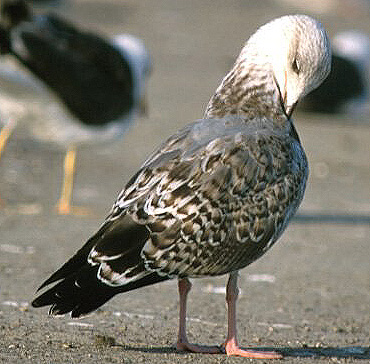 Yellow-legged
Gull- Geelpootmeeuw (L. michahellis): 2cy August
Yellow-legged
Gull- Geelpootmeeuw (L. michahellis): 2cy August
(last update: 08 december 2003)
YLG
1cy May
YLG
1cy June
YLG
1cy July
YLG 1cy August
YLG 1cy September
YLG 1cy October
YLG 1cy November
YLG 1cy December
YLG
2cy January
YLG 2cy February
YLG 2cy March
YLG 2cy April
YLG 2cy May
YLG 2cy June
YLG 2cy July
YLG 2cy August
YLG 2cy September
YLG 2cy October
YLG 2cy November
YLG 2cy December
YLG
3cy January
YLG 3cy February
YLG 3cy March
YLG 3cy April
YLG 3cy May
YLG 3cy June
YLG 3cy July
YLG 3cy August
YLG 3cy September
YLG 3cy October
YLG 3cy November
YLG 3cy December
YLG
sub-ad Jan.
YLG sub-ad Feb.
YLG sub-ad March
YLG sub-ad April
YLG sub-ad May
YLG sub-ad June
YLG sub-ad July
YLG sub-ad Aug.
YLG sub-ad Sept.
YLG sub-ad Oct.
YLG sub-ad Nov.
YLG sub-ad Dec.
YLG
adult January
YLG adult February
YLG adult March
YLG adult April
YLG adult May
YLG adult June
YLG adult July
YLG adult August
YLG adult September
YLG adult October
YLG adult November
YLG adult December
photo 11: Yellow-legged Gull michahellis 2cy, August 25 2000, Le Portel / Boulogne-sur-Mer, NW France.
 Another
pretty straightforward michahellis, easily identified by the bold
pattern on the coverts, the relatively dark grey fresh scapulars, the
salmon pink legs, the pitch black centres of the tertials and the advanced
moult stage in the primaries by the end of August: P8 is fully grown and
P9 has to grow just a few inches. The two upper tertials have been shed
and are the last to be replaced. In the greater coverts, only the #2 has
to grow a little and the other feathers show fresh white tips. The moult
strategy in the median coverts is rather complex with two moult gaps: #1-6
are fully grown, #7 is missing, #8-9 are fully grown, #10-12 are missing,
#13 is present. There are no feathers missing in the lesser coverts. In
the tail, most feathers have been replaced but some still have to grown a
few inches.
Another
pretty straightforward michahellis, easily identified by the bold
pattern on the coverts, the relatively dark grey fresh scapulars, the
salmon pink legs, the pitch black centres of the tertials and the advanced
moult stage in the primaries by the end of August: P8 is fully grown and
P9 has to grow just a few inches. The two upper tertials have been shed
and are the last to be replaced. In the greater coverts, only the #2 has
to grow a little and the other feathers show fresh white tips. The moult
strategy in the median coverts is rather complex with two moult gaps: #1-6
are fully grown, #7 is missing, #8-9 are fully grown, #10-12 are missing,
#13 is present. There are no feathers missing in the lesser coverts. In
the tail, most feathers have been replaced but some still have to grown a
few inches.